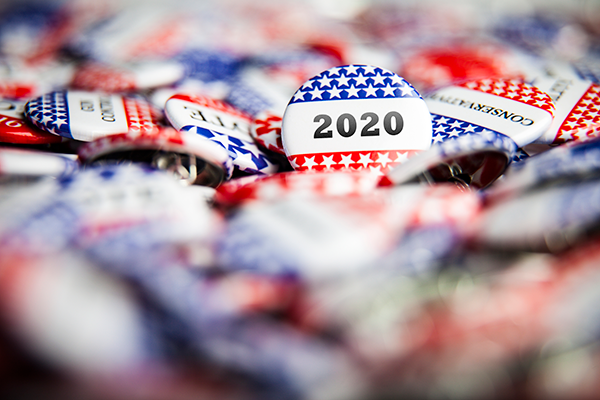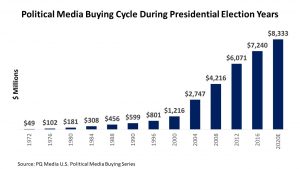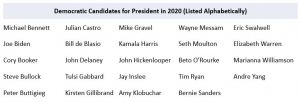
Contributor: Leo Kivijarv, Ph.D., Executive Vice President & Director of Research, PQ Media
When the Radio Advertising Bureau reached out to PQ Media a few months ago to continue our tradition of prognosticating political media buying, this time for 2020, I felt like the football and basketball reporters at ESPN and Sports Illustrated who release a Top 25 poll for the following season the day after the FBS Championship and Final Four. It’s too early to predict with so many unknowns, particularly given the political discourse of the past days, weeks and months. But I’ll give it my best shot, based on previous election trends.
Baseline Factors
- More money is spent during federal elections that include a presidential race
- Despite numerous Democratic candidates, primaries account for less than 20% of media spend
- Fundraising expected to break records and rise by 10%-20% compared with 2016
- Number of contentious Congressional races to drive the increase – 2018 had the most ever
- Voter turnout the key after a decline in 2016, particularly in states surprisingly carried by Trump
Preliminary Forecast for Overall Media Buying
Based on previous elections, PQ Media projects that political media buying could exceed $8 billion in 2020, possibly as high as $8.5 billion. Monies have already been spent in 2019 that exceed 2015 figures, particularly on marketing services like public relations, direct marketing, telemarketing, promotional products, experiential marketing and market research. (PQ Media does not release odd-year political media buying, although it includes any federal dollars spent towards the 2020 election in the final total.)

Possible Political Media Buying Trends 2020
The final total will depend on multiple factors, foremost whether the Trump team relies on the 2016 strategy of free earned media, rather than TV advertising (except for the last two months). If Trump relies on earned media, as well as experiential marketing & “digital-first” strategies, the total will be closer to $8 billion. If market research indicates he needs to spend more money on TV earlier in the campaign to reach the independents who are frustrated by his stonewalling on the Mueller investigation, the figure might be closer to $8.25 billion.
To reach $8.5 billion, it depends largely on how quickly the Democratic roster of candidates is dwindled down to two frontrunners by the Democratic convention. If it is done quickly, more money won’t have to be dedicated towards the primaries. If it takes longer, PQ Media will closely monitor next year’s broadcast television upfronts to ascertain ad inventory availability. The scatter market is considered strong for the 2019-20 season, but that might not be the case next year, fueling an increase in CPM rates and forcing candidates to look elsewhere to place ads, including radio and cable TV.
Democrats Field a Football Team of Candidates (Republicans Currently in a Tennis Match)
Post-Memorial Day, 24 Democrats and 2 Republicans have officially announced they are seeking the office of President of the United States. For those of you who haven’t kept notice, they are as follows:

Not all candidates are created equal. The co-captains of this football team are former Vice President and Senator Joe Biden (DE) and Senator Bernie Sanders (VT) per the early polling. They are expected to be the leaders in fundraising, an important component that gets a candidate to the later primaries. It is important to note that the favorites the year before an election most often do not win the nomination (not including incumbents), like the Republican cadre of candidates in 2015.
Playing running backs and wide receivers, who have a good chance of scoring an upset as the second tier of candidates include Senator Elizabeth Warren (MA), Mayor Peter Buttigieg (South Bend), Senator Kamala Harris (CA) and former Representatives Beto O’Rourke (TX), who rank second to sixth by early prediction models, like Kiplinger’s and Yahoo! Finance. These candidates are the most likely to have financial support throughout the primaries and could be the surprise winner, like Obama in 2008.
Playing in the defensive secondary and trying to intercept a possible pass into the nomination are the third tier of candidates, whose fate won’t be known until the first three primaries. They might sneak into the top 5, possibly as a favorite son or candidate from a neighboring state, thereby gaining more financial support for a longer run. They include: Senator Amy Klobuchar (MN), Governor Jay Inslee (WA), Senator Cory Booker (NJ), and former Governor John Hickenlooper (CO). Meanwhile, the tight ends who could impact the campaign are former Secretary of Housing & Urban Development and Mayor Julian Castro (San Antonio) and entrepreneur Andrew Yang (Venture for America – NY).
Most of the rest of the candidates will be like linemen in the trenches, gutting their way to a possible victory, with a lesser chance of scoring. They will have enough funds for only one or two primaries, unless they drop out before the primaries due to insufficient funds to run campaign ads in Iowa and/or New Hampshire. They include: Senator Kirsten Gillibrand (NY), former Representative John Delaney (MD), Representative Tulsi Gabbard (HI), Governor Steve Bullock (MT), Representative Tim Ryan (OH), Senator Michael Bennett (CO), Representative Eric Swalwell (CA), and Representative Seth Moulton (MA).
Rounding out the team on special teams, with little chance of gaining financial backing, are Mayor Wayne Messam (Miramar, FL), Mayor Bill de Blasio (NYC), author Marianna Williamson (The Healing of America – CA) and former Senator Mike Gravel (AK). The 89-year-old Gravel admits he has no chance of winning the nomination and only entered the race “to bring a critique of American Imperialism to the Democratic debate stage.”
Other names have been bantered about as possible replacements on the team, like State Senator Stacey Abrams (GA), Senator Sherrod Brown (OH), former Governor Terry McAuliffe (VA), Senator Chris Murphy (CT), Senator Jeff Merkley (OR), former Attorney General Eric Holder (NY), former Mayor Mitch Landrieu (New Orleans), Governor Andrew Cuomo (NY), and former Governor Deval Patrick (MA). Names of billionaires and celebrities have also been referenced, including Mark Cuban (Dallas Mavericks/Shark Tank), Howard Schultz (Seattle Supersonics/Starbucks), Tom Steyer (Farallon Capital), and Dwayne “The Rock” Johnson (WWE/Hobbs & Shaw) There are no indications that these individuals have come close to filing with the Federal Election Committee, although a number of them most likely developed an informal network of friends to explore options.
Four individuals, who might have been the coach of the team and gain almost immediate recognition as a frontrunner (and conversely strong financial support), announced that they will not seek the nomination. These include former Secretary of State, Senator & First Lady Hillary Clinton (NY/AR), former First Lady Michelle Obama (IL), former Mayor Mike Bloomberg (NYC), and talk show host, actress and media owner Oprah Winfrey (IL). Also mentioned as a possible candidate is Representative Alexandria Ocasio-Cortez (NY), but the U.S. Constitution forbids her from running until she is at least 35 years old, which can’t happen until the 2024 election.

The Republican tennis match is currently between President Donald Trump and former Governor Bill Weld (MA), who is lobbing the ball high in hopes of Republican dissatisfaction with the current administration. If he were a Democratic candidate, he’d probably be lumped in with the linemen or special teams. Other politicians and businesspeople critical of Trump have also been discussed as possible candidates, including former Senator Jeff Flake (AZ), former Senator Bob Coker (TN), former CEO Carly Fiorina (Hewlett-Packard – CA), former Governor John Kasich (OH), Senator Ben Sasse (NE), Governor Susana Martinez (NM), Senator Ted Cruz (TX), and Senator Mitt Romney (UT). If Trump is embroiled in impeachment proceedings leading up to the Republic convention, some wonder whether he’ll be pressured by the Republican Party to step aside and let Vice President Mike Pence be at the top of the ticket.
During next week’s post, I will cover additional races as well as review where radio fits in this early prediction.

